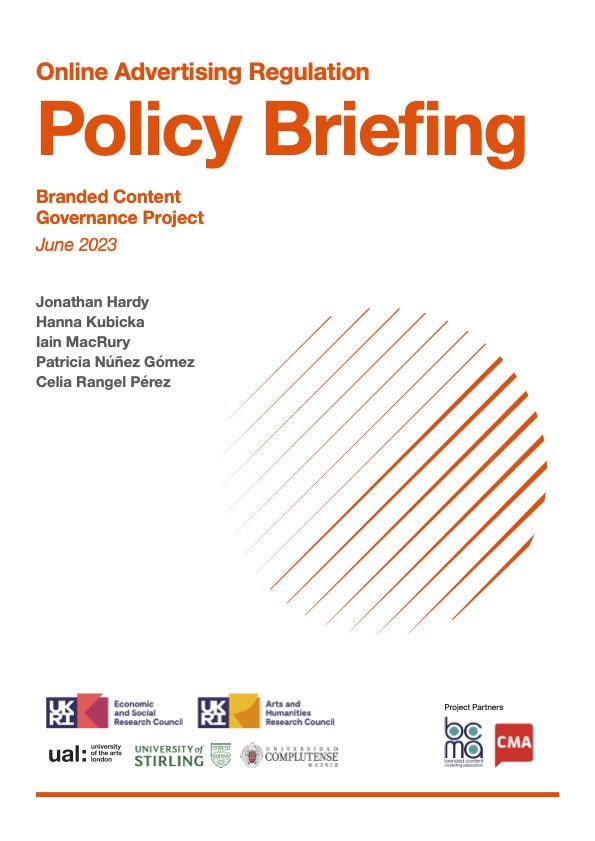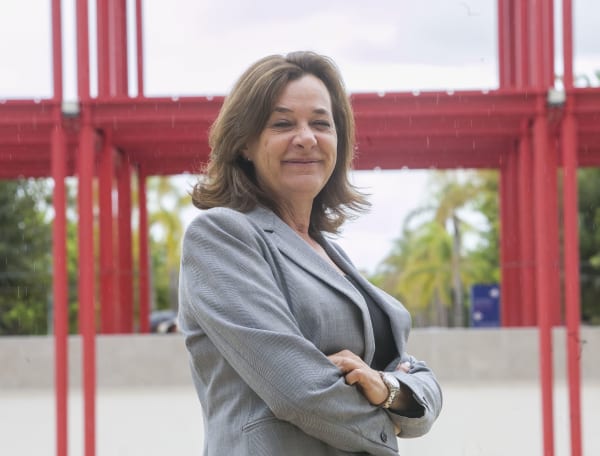This international research project examines the regulation, policies, practices and communications surrounding brand-funded content. This includes sponsored content, native advertising and influencer marketing.
Branded Content Governance is supported by 2 UK Research Councils:

Our aim
We'll produce a detailed mapping of the emerging rules and practices for branded content across the UK, all EU countries, the US, Canada and Australia.
The second stage of analysis will involve UK and Spanish research teams. These will investigate how branded content governance is practiced and understood by:
- practitioners,
- policy actors and stakeholders
- and discussed within professional and public media.
An international network of academics and industry partners will also contribute throughout.
This research project builds on an international academic network. The Branded Content Research Network is co-ordinated by the Branded Content Research Hub which is housed in the Media School at London College of Communication. The Hub includes staff across UAL, international academics, and external partners from industry and civil society.
Project summary
The relationships between media and advertising are changing as they converge. Brands are involved in the production of publisher-hosted content.
Such non-traditional advertising, which blends brand messages with entertainment or information, grew faster than conventional advertising worldwide in 2017, with double-digit growth forecast from 2021.
Branded content is content that is funded or produced by marketers. This includes brands' own media content but also forms of paid advertising that are 'native', blending into the non-advertising communications environment in which they appear, such as editorial-like ‘sponsored content’ hosted by publishers, and 'influencer marketing': paid promotions by social media communicators.
Research need
Branded content has been the focus of business and creative strategies, and of deepening controversy. Marketing that is disguised has generated most concern, ranging from deception and reader awareness to the impact on media quality and trust.
There are powerful pressures driving the integration of advertising and media. We need research to examine what is happening, to ask searching questions on behalf of consumers and wider society, and to put forward well-informed proposals for how rules and practices can be improved.
Our activities
This research project builds on collaboration and dialogue between the industries involved, regulators and those affected, and draws on an international network of academics.
We will provide a detailed, cross-national mapping of the emerging rules and practices for branded content across Europe and selected other countries. We will identify and examine how industry practitioners, regulators and stakeholders are managing and evaluating the process of creating and enforcing rules for fast-evolving practices.
We will use our research findings to inform policy-making, support governance initiatives, advance scholarship and aid wider public understanding and debate.
We aim to provide important insights and recommendations for managing and regulating communications in the digital age.
Publications
Read our recent publications. We're aware these documents aren't entirely accessible but we're working to create accessible versions and will replace them once ready.
Online Advertising Regulation: Policy Briefing
Read the briefing on developments in UK policy concerning digital advertising regulation, and find out more about initial research work for the Branded Content Governance Project.
This briefing includes details of advertising policy developments in the UK but sets them in wider context, including EU law and policy, and includes a report on related policy developments in Spain.

The UK Branded Content Industry: Report and Survey
Read the survey and analysis of the ‘state of the profession’ for those working in branded content marketing in the UK.

Newsletter
Read our latest newsletters, covering recent activities, in our Figshare repository.
Policy submissions
Project team
-

Professor Jonathan Hardy
Principal Investigator and Project Lead, and Professor of Communications and Media, School of Media, London College of Communication, University of the Arts London.
-
Professor Iain MacRury
Co-Investigator and Professor Media and Communication, Faculty of Arts and Humanities, University of Stirling.
-

Professor Patricia Núñez Gómez
Co-Investigator (International) and Professor of Advertising Theory, Faculty of Communication Science, Complutense University of Madrid.
Project partners and participants
Project participants include key policy stakeholders from industry, trade unions and civil society, involved as research subjects, academic advisers and other contributors to events and outputs.
- Branded Content Marketing Association (BCMA): the global industry body for branded content practitioners, run by practitioners, promoting best practice, sharing knowledge and growing the branded content industry
- Content Marketing Association (CMA): the industry association for marketing, publishing, advertising and social agencies
- Julian Coles, former Policy Director, Internet Commission, member of UNICEF's working group on GDPR and children's rights and Internet Watch Foundation's Ethics Committee
- Jo Farmer, Partner, Lewis Silkin
- Pete Fergusson, CEO, Nemorin Film and Video
- Scott Guthrie, co-chair CIPR Influencer Marketing Panel and Director, Influencer Marketing Trade Body
- Spanish project participants include BCMA (Spain), Asociación de Directivos de Comunicación, Infancia y Comunicación, and Grupo de Sociología de infancia y adolescencia: GSIA
Academic advisors
UK
- Bjoern Asmussen, Oxford Brookes University
- Dr Anne Cronin, Lancaster University
- Professor John Downey, Loughborough University
- Professor Chris Hackley, Royal Holloway University
- Dr Guido Noto La Diega, University of Stirling
- Professor Peter Golding, emeritus, Northumberland University
- Professor Andrew McStay, Bangor University
- Dr Liz McFall, Edinburgh University
- Professor Paul Springer, Falmouth University
- Dr Martin Moore, Kings College, London
- Professor Dan Jackson, Bournemouth University
- Professor C. Johnson, Huddersfield University
- Professor D. Freedman, Goldsmiths College, London
- Dr Agnès Rocamora, London College of Fashion, UAL
- Professor Nick Couldry and Dr Damian Tambini, London School of Economics
- Professor Paul Grainge, Nottingham University
- Dr Leslie Meier, Leeds University
- Prof. Maria Michalis, University of Westminster
- Dr Helen Powell, South Bank University
- Dr Hysunsun Yoon, University of Greenwich
- Dr Rula Al-Abdulrazak, University of East London
- Dr. Sevil Yesiloglu, London College of Communication, UAL
European Union
North America; Australia; the Rest of the World
- Austria: Dr. Maren Beaufort, Institute for Comparative Media and Communication Studies (CMC) of the Austrian Academy of Sciences and the University of Klagenfurt
- Austria/Switzerland: Prof. Natasha K. Just, Prof. Michael Latzer, University of Zurich
- Belgium: Professor K. Poels, Professor T. Smits, Dr S. Paulussen and Dr S. Krouwer, Antwerp University
- Bulgaria: Dr Lada Price, University of Sheffield
- Croatia: Dr. Paško Bilić, The Institute for Development and International Relations
- Cyprus/Greece: Theodora Maniou, University of Cyprus
- Czech Republic: P. Audyova, Charles University
- Denmark: Professor Anne-Marit Waade, Aarhus University
- France: Professor Sandra Arrivé, IPAG Business School
- Germany: Professor Guido. Zurstiege, Tübingen University; Dr. Nils Borchers, Tübingen University
- Greece: Prof. Stylianos Papathanassopoulos, Dr. Aikaterini Stavrianea, Dr. Achilleas Karadimitriou, National and Kapodistrian University of Athens
- Hungary: Á. Buvar, Eotvos Lorand University
- Ireland: Dr Neil. O’Boyle, Dublin City University; Dr Maria O’Brien, Queen’s University Belfast
- Italy/Switzerland: Dr G. Dagnino, Università della Svizzera Italiana
- Latvia: Prof.Anda Rožukalne, Riga Stradiņš University
- Lithuania: Dr Deimantas Jastramskis, Vilnus University
- Malta: Prof. Carmen Sammut, University of Malta
- Netherlands: Prof. Eva A. van Reijmersdala, University of Amsterdam
- Poland: Dr. Marzena Barańska, Jagiellonian University
- Portugal: Prof. Rui Estrela, University of Lusófona
- Slovakia: Dr. Zuzana Hajduová, University of Economics in Bratislava
- Slovenia: Prof. Vesna Žabkar, University of Ljubljana
- Spain: Co-investigating Professor Patricia Núñez Gómez, Universidad Complutense de Madrid (UCM); Dr Celia Rangel Perez, UCM; Professor J. Fernández-Cavia, Pompeu Fabra U; Dr. L. Mas-Manchón, Pompeu Fabra; Dr. María Rodríguez-Rabadán Benito, Universidad Internacional de La Rioja; Dr. Lucia Gloria Vázquez Rodrígeuz, UCM
- Sweden: Dr R. Ferrer-Conill, University of Stavanger, Norway, Karlstad University, Sweden
- Dr M. Amazeen, Boston University
- Professor M. Einstein, CUNY
- Professor J. F. Hamilton, Georgia University
- Professor Matt McAllister, Penn State University
- Professor Joseph Turow, Pennsylvania University
- Professor Janet Wasko, Oregon University
- Professor Dwayne Winseck, Carleton University
- Dr S. Khamis, University of Technology, Sydney
- Mexico/UK: Carl W. Jones, University of Westminster
- Dr Ilhem Allagui, Northwestern University, Qatar
- Dr Arturo Arriagada, Adolfo Ibáñez University, Chile
- Dr Anat Balint, Tel Aviv University
While the project examines the countries and regions above, project advisers include the following academic experts:
Project objectives
The over-arching objective is to provide a detailed, cross-national, comparative mapping of the emerging regulation and industry practices of branded content across Europe and selected other countries to inform the assessment and development of governance arrangements by stakeholders. This will be achieved through 6 research objectives.
- Determine the current regulation and governance arrangements for branded content through systematic cross-national comparison and identify and assess indicators of governance effectiveness and industry and stakeholder support.
- Assess the key agencies and processes involved in the new media-marketing ecology, including automation and artificial intelligence, and their implications for governance of the relationships between marketers, marketing agencies, media and communication users.
- Identify how industry practitioners and policy actors assess the suitability, ethics and governance of branded content practices to inform recommendations for governance action.
- Report on media coverage and public mediated discussion of branded content governance in selected general and specialist ('trade') media and online communications, and assess the implications for stakeholder and public understanding.
- Drawing on project research data and wider literature review, produce and disseminate governance recommendations on branded content, including digital/media literacy, online safety, marketing communications and media governance, to inform governance practices for communications.
